We’ve all come across those “high vibe” sparkly-toothed people before.
Perhaps we’ve gone through financial troubles, are suffering a bad relationship, have a sick loved one, or are feeling depressed.
We’ll then reach out for support to one of these love-and-light people and are met with a wall of positive statements like:

Spiritual Wanderer Course:
⭐️⭐️⭐️⭐️⭐ "I started the Spiritual Wanderers Course a short while ago and for the first time in twelve years I have started to experience love, acceptance and compassion for myself and within myself. Thank you so much." – Vivienne S.
- “Just focus on the positive!”
- “Don’t be so negative!”
- “Think happy thoughts!”
- “You’ll get over it!”
- “Stay positive!”
- “All is love!”
- “There’s always a silver lining!”
But these sayings, while supposedly wise and spiritual, don’t actually help us. Instead, they fill us with rage and nausea – we have the sudden urge to leave the room screaming!
Why do we feel this way, you might wonder?
The answer is that these statements are invalidating and they are a form of toxic positivity.
When we are in pain, we want to be seen, acknowledged, and validated. We don’t want to be dished out superficial advice.
One of the biggest traps on the spiritual journey is toxic positivity or the “good vibes only” fallacy. And if you keep coming across it on your path, whether within others or yourself, here’s how to handle it:
Table of contents
What is Toxic Positivity?

Toxic positivity is, quite simply, an addiction to positive thinking. It can be seen as an underlying attempt to avoid negativity or painful feelings in ourselves and others. In other words, toxic positivity can be seen as a kind of “negativity phobia” where we bypass conflict through an obsession with maintaining “happy” thoughts and emotions.
Toxic positivity & Spiritual Awakening

For anyone on the spiritual awakening journey (or those who have a basic interest in self-growth), coming across toxic positivity is inevitable.
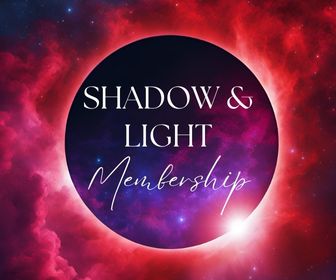
Shadow & Light Membership:
⭐️⭐️⭐️⭐️⭐ "Shadow and Light’s weekly guidance always rings true to my heart. Thanks for acknowledging my shadows and inviting my inner light. I always get excited to open the Shadow and Light emails on Sunday!" – Angela M.
What’s the first thing that comes to mind when you contemplate toxic positivity and the “good vibes only” message? Usually, it’s one of those new-age bookstores – or that super “woke” person who loves crystals and reiki.
But toxic positivity is lurking everywhere – in meditation groups, yoga retreats, self-improvement books, everyday people, work colleagues, and seemingly grounded teachers/gurus dishing out spiritual guidance.
While on the surface focusing only on the positive seems empowering, it’s actually one of the most unhealthy philosophies in life.
Why?
Here are a couple of reasons:
- When we’re trapped in the cycle of seeking positive vibes and avoiding conflict, we’re not actually growing as people. Instead, we’re stuck in a negativity-avoidance cycle that encourages us to abandon ourselves (and others) in times of need.
- Toxic positivity doesn’t give space for people to feel and process their emotions, and therefore promotes mental and emotional repression. This repression, in turn, leads to recurring problems in our lives (I’m talking addictive tendencies, explosions of anger, chronic anxiety, neurotic behaviors – the whole shebang).
Let’s face it: on the surface, the “good vibes only” message appears kind of cute and new agey.
It’s a message that can even be mistaken for being empowering and is frequently marketed as the key ingredient to a flourishing life.
But the reality is that dogmatic positivity (in any shape or form), denies our basic need for authentic self-expression – and we need to be very careful of that.
4 Disturbing and Harmful Signs of Toxic Positivity
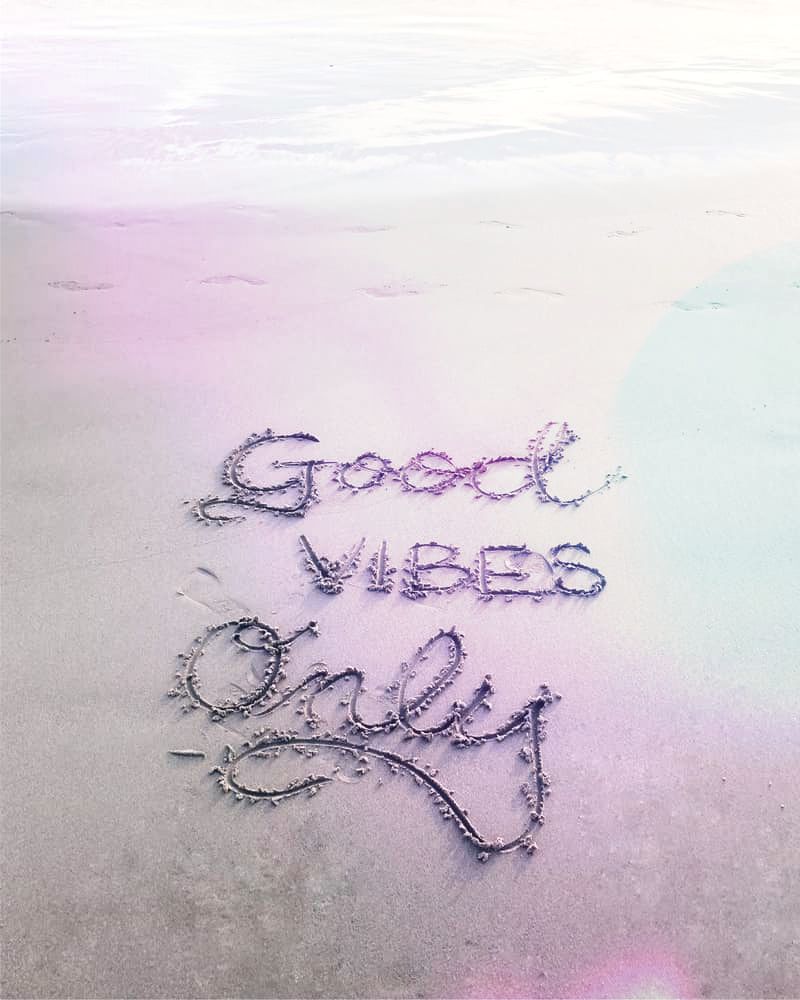
Toxic positivity is forced, false positivity. It may sound innocuous on the surface, but when you share something difficult with someone and they insist that you turn it into a positive, what they’re really saying is, My comfort is more important than your reality.
– Dr. Susan David, (Author of Emotional Agility)
I have come across my fair share of “turn that frown upside down!” people in my field of work.
Below, I’ll share with you how exactly toxic positivity can manifest that I’ve observed through the years:
Would you like to save this?
Your information will never be shared.
- A phobia of critical thinking – In the realm of toxic positivity, critical thought is generally perceived as something “negative” and unsavory. Questioning and pointing out flaws and logical fallacies is something frowned upon and is often immediately shunned – along with the person – who is perceived as a “troll,” “trouble-maker,” “argumentative person,” or most condescending of all, an “unawakened person.”
- Dogmatic positivity – If you don’t agree with what the Good Vibes Tribe has to say or what they believe, you’re passive-aggressively outlawed. Don’t expect to receive genuine empathy or emotional support from them – you’ll be met with a wall of feel-good aphorisms and spiritual rhetoric.
- Spiritual ego disguised as ‘wokeness’ – There’s an undeniable undercurrent of self-righteousness inherent in toxic positivity and Good Vibes Only mentality. It’s almost as if such people believe themselves to be “more evolved” or on a higher plane of existence than others. This spiritual egotism triggers feelings of shame and unworthiness in those reaching out for help and support.
- Gaslighting – Gaslighting is a manipulation technique that is favored by the Good Vibes crowd – it makes you question your sanity and reality, therefore increasing the power of the “always be happy” philosophy. Never doubt the power of the spiritual ego, it will go to any length to maintain its position of rightness and righteousness.
Can you recognize any of these behaviors in another person, group of people, or even yourself?
How to Deal With Toxic Positivity

If you frequently come in contact with someone who vomits rainbows-and-sunshine over you, you might wonder what you can do to put an end to such purgatory (I say unsarcastically).
It’s not nice being gaslit, invalidated, and shamed for our painful emotions or experiences. Here’s what you can do:
- Know that experiencing negative emotions or circumstances in normal. It’s okay to feel scared, angry, jealous, sad, or insecure. Don’t let anyone tell you otherwise. You’re allowed to be human!
- Understand that their behavior comes from fear. People don’t adopt cultish ideas for the heck of it; they do it out of an underlying sense of fear and powerlessness. So once you have the emotional space, take some time to come to grips with this reality. It’s empowering to understand the deeper causes of someone’s harmful behavior. (Read: Why Are People So Mean?)
- Seek out someone who is ready to hold space for you. Toxic positivity doesn’t hold space for anyone – it can’t because it’s too busy try to run away from negativity. So find someone you trust, maybe a friend, family member, or therapist, and ask them to hold space for you. Holding space means listening to and embracing another person, exactly how they are. If someone shows signs that they’re not able to hold space for you, keep your boundaries and find someone who can.
- Practice self-care. It’s not nice being bulldozed by positivity – it feels terribly isolating and can make you feel like there’s something “wrong” with you. So don’t forget to take care of yourself. Do something nurturing as an act of self-love like making a calming cup of tea or taking a walk in nature. (Read: How to Love Yourself)
What to Do if YOU Are Struggling With Toxic Positivity

In life, we like to believe that there are victims and perpetrators. But sometimes, the victim can become the perpetrator and vice versa.
None of us are perfect, and that’s okay.
Here’s what to do if you are the one who has fallen into the Good Vibes Only trap:
1. Pinpoint which issues you’re struggling with
Put simply, toxic positivity is a type of negativity phobia.
See which of the following issues you’re struggling with (and be honest):
- You avoid people or situations that create uncomfortable feelings in you at all costs.
- You’re attracted towards the lighter and more “high vibe” aspect of spirituality, but feel repelled (and maybe also irresistibly drawn to) the shadow side or Underworld path of spirituality.
- You can’t handle criticism well (even if it is a well-meaning critique) and feel terribly upset or insecure.
- You feel unusually defensive or on-guard around others.
- You’re highly sensitive to people’s thoughts and opinions about you.
- You intentionally try to block out all forms of negativity from your life.
- You refuse to acknowledge your shadows.
- You tend to be an idealist.
- You feel intense and overwhelming emotions such as anger, fear, hatred, or disgust when you’re confronted with a negative person.
If you don’t journal yet, invest in a journal and make a regular habit of writing down your thoughts and feelings. The simple habit of journaling is a wonderful way of developing more self-awareness. (See: How to Journal)
You can also use the above symptoms to journal about. Ask yourself questions such as, “Where did this originate?” “How does this impact me/others?” “What can I do to create more balance?”
2. Understand that conflict/negativity is actually a good thing
Here’s why conflict is such a powerful teacher:
- It helps you to develop more patience and forbearance around others.
- It helps you to “see beyond the veil” of another’s actions and develop deeper insight and compassion for them.
- It reveals your own areas of vulnerability and insecurity.
- It shines a light on your shadow tendencies.
- It can point out where you’re genuinely going wrong.
- It’s a no-bullshit teacher that reveals how you can grow more.
- It’s a way to test your emotional and spiritual maturity.
Having someone say “no, you’re wrong” or “that’s totally ridiculous!” is an immensely valuable gift.
Even if the person is NOT coming from a conscious or caring place, it’s a gift to experience conflict from others for it reveals the truth about ourselves.
The way in which we react to others speaks volumes about our capacity to practice kindness and understanding.
Furthermore, the way in which we react to others is a mirror of our own pain, insecurities, and fears.
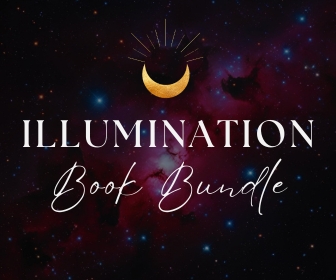
Illumination Books Bundle:
Discover the hidden dimensions of your soul with our Illumination e-book series – your complete companion for self-understanding and spiritual growth. Each book serves as a lantern in the darkness, guiding you toward clarity, purpose, and inner peace.
3. Learn how to embrace conflict

Embracing conflict doesn’t mean enjoying it or seeking it out.
Instead, embracing conflict is about adopting a mindful attitude that values the experience as something useful to learn and grow from.
Here’s how to work towards embracing conflict and overcoming toxic positivity:
1. Stop and take a deep breath. Ground yourself. Catch yourself before you react. Walk away if you must. Take a few moments to gather yourself, and then respond.
2. Ask yourself, “What is this person or situation secretly teaching me?” Sure, the person might be acting like an asshole, but what message is being embodied through their actions?
3. Be curious and adopt an attitude of interested awareness when you feel triggered. Look at the emotions surging through your body. Examine the thoughts in your mind. Take note of how you’re feeling. To do this, you need to practice mindfulness exercises like conscious breathing or observing. If you can’t get into a mindful place within yourself, walk away or count your breaths.
4. Ask yourself, “What is actually hidden behind this person’s negativity?” Stop taking emotions and apparent motives at face value. Try to think of all the possible reasons why that person is being negative. For example, maybe they have severely low self-worth. Maybe they are lonely and want attention (whether good or bad). Maybe they just went through a breakup. Maybe one of their loved ones just died. Maybe they’re experiencing a stressful day. Maybe they feel angry and sad about life. Be open to alternative explanations, there are endless possibilities.
5. If you get emotionally triggered, reflect on the experience. What was it about the person that infuriated you so much? Instead of blaming them for being “low vibe” or toxically negative, try to find the opportunity for growth that is being presented to you.
6. Understand that all negative behavior has its root in pain. When I say pain, I mean emotional pain such as sadness, loneliness, emptiness, and fear. Once you can truly understand this for yourself, you’ll be able to empathize with the person (instead of trying to get them to be positive).
4. Hold space for your own pain
Chances are that if you’re in the habit of being excessively positive, you were taught at some point that showing any form of negative emotion was bad and deserved punishment.
To overcome toxic positivity, you’ll need to learn how to befriend your pain. Furthermore, by turning toward rather than away from your negative emotions, you’ll finally be able to hold space for others in a meaningful and compassionate way.
To hold space for your pain, you’ll need to:
- Learn how to practice genuine self-love
- Take care of your wounded inner child
- Face and identify your shadow self
Remember that dealing with negativity in a healthy way is a process, so it will take some time. Be gentle with yourself, go slowly, and be persistent – you’ve got this!
Toxic Positivity FAQ

Before we finish this article, let’s explore some frequently asked questions surrounding toxic positivity:
Responding to toxic positivity differs according to the context. If you come across well-meaning toxic positivity in a close relationship, clarify your needs to the other person and let them know that you simply need them to hold space for you. For example, you might say, “I know that being positive is good, but right now I just need you to hold space for me and listen.” If the person wasn’t well-meaning (i.e., judgmental, condescending, rude) – no matter whether in a close relationship or acquaintance situation – swiftly end the conversation. Unless you’d like to argue or tell them off (which will exacerbate the situation and reinforce their toxic positivity – although I don’t blame you!), the best thing to do is end the conversation naturally and create space. You now know that such a person isn’t suitable for holding emotional space for you. Then, find someone who can support you, if even a silent pet who you can cuddle with.
Those who are toxically positive usually don’t intend to be abusive – they think they’re being helpful or supportive. Unfortunately, toxic positivity is indeed a form of emotional abuse that is often unintentionally committed because it mistreats the person who is “being negative” by denying their reality.
Any behavior which denies, overrides, judges, or rejects the reality of “negative” feelings or experiences in another person is a form of toxic positivity. An example is telling a friend about something that upset you, and them responding with a dismissive statement like “You’ll get over it!” “Happiness is a choice!” etc.
Yes, toxic positivity can absolutely be a form of gaslighting! If gaslighting is all about making you doubt your reality, toxic positivity can be a handy tool to make you feel like you’re “overly negative,” “too sensitive,” “imagining things,” etc.
Takeaway
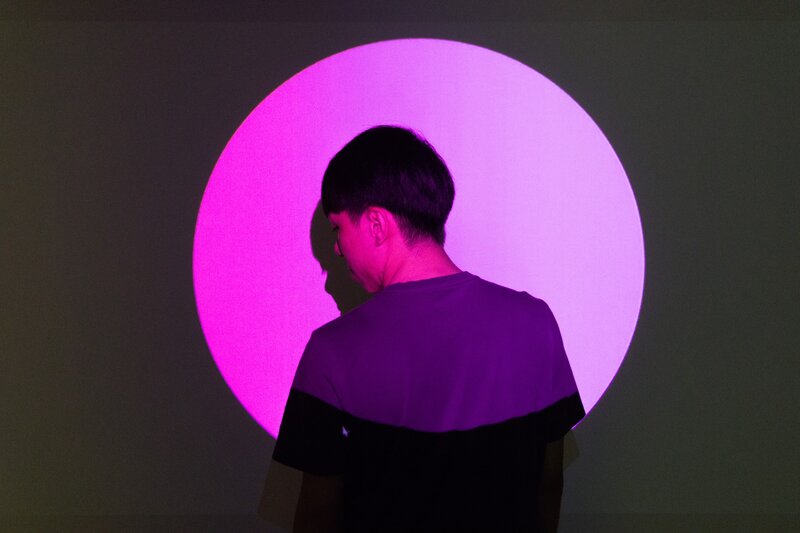
Toxic positivity is a trap that’s so easy to fall into on the spiritual path – or simply life in general!
Whether you’re experiencing this cult of positivity at the hands of another, or within yourself, remember that having negative emotions is normal, healthy, and human.
Does nature judge itself for having thunderstorms, avalanches, and earthquakes? No! So why should you? You are part of this dance of life too.
What is your experience with toxic positivity?
Three paths to inner transformation – here’s how I can help you go deeper:
1. The Spiritual Wanderer Course: Are you feeling lost, adrift, and unsure of your life's purpose? Gain clarity, focus, and direction on your inner path by uncovering the five archetypes of awakening within you. Learn how to navigate the highs and lows of your inner journey and chart your unique path with 3+ hours of audio-visual content, workbooks, meditations, and a premium test.
2. Shadow & Light Membership: Do you crave consistent support on your spiritual quest? Receive weekly intuitive guidance and learn to embrace your whole self, including your shadow side. Cultivate deeper self-love with our affordable, personalized support.
3. Spiritual Awakening Bundle: Ready to embark on a profound soul-searching adventure? Dive into our collection of essential transformative resources! Explore five illuminating eBooks and seven in-depth journals, plus unlock two special bonuses to empower your spiritual growth.

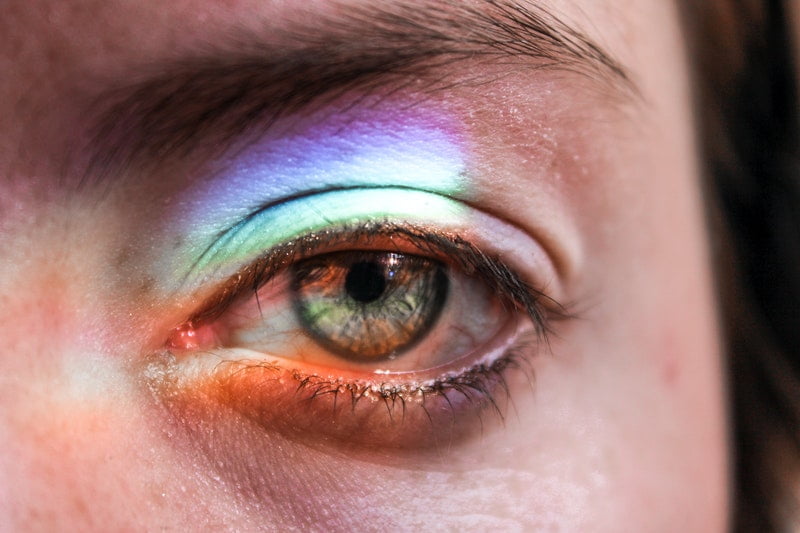






Hi, I agree that the good vibes only mentality can be harmful but I also think that sitting in and accepting every conflict for the sake of learning is harmful too. Sometimes it is better for a person to avoid conflict to prevent unnecessary damage to themselves. Sure pain and suffering can make you stronger but at the same time, it can set you back and impede you from your journey if it is an unnecessary conflict. While I realize that my belief that everything should be purpose-driven is not a universal belief, I feel that aspiring for balance in all things is healthy and helpful for the spiritual journey. Another thing that I feel is important to point out is that sometimes people are not receiving of criticisms and while that can be harmful, sometimes it’s better not to judge them and allow them to figure out things for themselves. If you genuinely care about them, sometimes you need to be patient enough to let go of the no bs, tough love, in your face approach to instead give a compassionate and gentle advice. I have found that this is true with my mother, my spouse, and myself. It’s not that we can’t take criticism or only want to hear pleasant things about ourselves. We just want to feel completely loved and accepted by the people that matter to us. We aren’t the type of people who say good vibes only and don’t want others to challenge or have conflicts with us, however, we don’t want to be antagonized and mistreated because we have flaws or things about ourselves that bother other people. We want to be loved unconditionally for who we are and allowed room to grow and improve while we hear negative feedback. So I say all this to make the point that while everything is not all rainbows and sunshine, not everything has to be pain and suffering either. Aspire for balance. If you care about someone and want them in your life, be patient and compassionate with them. Accept them for who they are while challenging them to be better. Don’t withhold care or be abusive towards them until they be better or act they way that you think they should. That will cause unnecessarily destructive conflicts and push people away.
I’ve been there with critical thought not being well-received. On a Facebook group discussing one “channelled” writing I pointed out a clear error of fact – the channelled text clearly assumed the Myth of the Flat Earth (that people in Medieval Europe believed the earth was flat until Columbus’ voyages) – and therefore the channelled text had a verifiable error.
This did not go down well, and I was patronizingly told to open my heart. One thing I do admire about Marianne Williamson, although I don’t agree with all her political views, is she doesn’t try and do this avoidance of conflict at any cost thing. As she says, sometimes love needs us to say “no”.
Thank goodness someone else sees this. People look at me like I’m nuts, but I prefer authenticity over what I call “toxic positivity”. It’s great to be positive when you can about what you can. And gratitude goes a loooong way towards achieving that. But I’m tired of the “ghost of you’re uncomfortable or someone gets mad at you” philosophy which seems to generally be the actual thing hiding behind “good vibes only”. Relationships require open communication and hard work, which means being uncomfortable sometimes. Let us all attempt to be more brave and address things directly!
To be honest, I personally have more trouble accepting the love and light side of spirituality than the other way around. I was the type of kid who didn’t believe in Santa growing up, natural cynic I was, but I just wanted to share my own frustration.
The overly love and light attitude doesn’t just anger me, it really. . . just worries me. People say ignorance is bliss, but that’s only in the short term. Knowing the truth is not just an intellectual necessity in a decision, it’s also something that could prevent danger. By lying, you take away people’s ability to make their own decision about the issue, so I tell the truth, whatever, because I fundamentally understand what that feels like.
It’s just “overly love and light” people don’t think of the negative consequences of what they’re doing as much. They don’t think long term, I mean, while I personally have trouble being present. Honestly, there are always conflicting philosophies when it comes to time, but I believe there’s a balance. Learn from the past, enjoy the present and prepare for the future. The problem for about every spiritual obstacle is that someone only focuses on two of these, or worse, only one.
People who only want to learn from the past become staunch traditionalists who maintain the status quo. People who only enjoy the present become hedonists prey to all kinds of addictions. People who only prepare for the future end up becoming worriers who can never seem to relax.
Sigh, if only it was just taught more often to appreciate all those perspectives if you ask me.
I want to thank you, Aletheia Luna, once again for an informative article, written with heart, mind & soul with ego that is in check. It is rare, first of all, to read something that is useful in my daily life, and secondly, it is written in a way that does not talk down or preach. So many articles on this type of subject matter come off as “author knows best”, even from those authors who seem to have the best of intentions. I don’t know how you do it, but your articles always inform and provoke deep reflection; and as argumentative as I am getting as I grow older, I haven’t felt anything but admiration when I read your work, as well as the desire for introspection on the topic.
I particularly like what you said about a loving, healthy & soul mate relationship bring on the welcome death of the ego, including the healthy arguing/fighting that ensues in the beginning of such a relationship. My husband and I often laugh about this phase of our union. Sometimes other people found us a bit scary…but we instinctively felt in our souls that we were right where we needed to be–individually and as a couple. I haven’t read much about that phase of a great relationship, though I’ve known several people who have had the experience.
Please keep your loving and lovely articles coming!
Blessings…
This was a very interesting article, and I have finally gotten to the point in my life where I am learning to embrace conflict. I never enjoy it, but some of the greatest lessons I have learned about myself have been due to conflict, either with another person, myself, or circumstances. I have become mindful enough that, most of the time, I am able to respond instead of react. I am so grateful for this! My sense of calm wellbeing doesn’t depend on how others behave anymore. It depends on my own sense of comfort and ease within myself. I feel like the “Good Vibes Only” mentality only leads to dishonesty, where people are only saying and doing what they believe others want them to. I am into Truth nowadays, and if confronting the Truth means a conflict of some sort, so be it! I am so much happier now that I am not living my life according to how I think I need to be perceived.
I just joined your community here this week, and I am loving it! I literally feel like I’ve “found my tribe” here, and I look forward to learning and sharing more. Thank you for everything!
I have been trying self improvement for over 20 years now with not many positive results. I have been to this site before,but have been overwhelmed by the things that I must do. I keep coming back to this site because I see all over the place in one way or another that I do need to be mindful and aware in order to stop being so angry and negative. I need to learn from my CONSTANT conflict with my wife and kids and maybe things can get better.
In response to this excerpt, I just think that people who are into spirituality and self-help are generally very sensitive souls. It is this sensitivity that enables one to believe in the very essence of spirituality itself, to begin with. However a sensitive is also very reactive since they feel a lot more compared to most, sensitives get triggered easily and are easily offended. A sensitive who is untrained in dealing with this negativity and emotional discomfort will most probably have a negative reaction towards emotional conflict, and it is up to them really whether they want to work on it and improve themselves in being more “responsive” rather than “reactive”..It’s no easy feat though. It’s very uncomfortable for a sensitive, which is why many seek this “good vibes only” shiz…only cause it’s easier.
But I agree. The good vibes only thing is flawed. Humans are humans, erroneous and wayward in nature, hence emotional conflict is 100% inevitable..it’s all about having a good grip on conflict resolution and learning to get along.
Hi Anthea. Thank you for these thoughts and reflections.
I think you’re right in saying that sensitive people tend to choose the good-vibes-only approach as it’s the easiest path for them due to their sensitivity. However, I also believe that sensitive people are just as capable of adopting the self-righteous spiritual ego as other ‘normals.’ I don’t think it’s either-or, but both are potentials.
-Luna
I do not fully agree. I am a sensitive person but i always was about letting show the emotions, sadness and anger etc. That’s why i can’t handle my ‘narcissistic web family’ anymore and i broke-up. I am the sensitive one (HSP) And mostly have experienced this from who’s cognitives is only about ‘what they see, hear and feel at that moment (sensors)’ they just get stuck and serve it that way, do not want to go hear the ‘deeper feelings/opinions’ (intuition side, the connections)
Francisco, I think what Aletheia means about embracing conflict is not to avoid it but live it. The more we do this, then the more self-awareness and compassion will ensue. Not just towards others in many cases, but as importantly to ourselves. I have lived a lifetime of very deep sadness and toxic shame but am absolutely not afraid of conflict when it arises. I embrace it. Many years ago, I could not have imagined getting to this point. Every good wish. Paul Z.
When I first heard “Good Vibes Only”, I felt annoyed and angry. Then I kind of shifted into liking it. As I understand it, everything in your article is “Good Vibes Only”. It’s not about avoiding conflict, it’s about cultivating mindfulness and using challenges to grow.
That’s an interesting approach Renee. :) This comment shows that ultimately good-vibes-only is a label that *we* define – so we’ve got to take responsibility and ensure that definition is healthy and not destructive. Thanks for commenting. ;)
What an excellent article. I’ve recently been exploring the path of ‘Be Curious, Not Judgmental’ and this article kind of reaffirms this. My previous partner and I had a heap of conflict during our relationship and I always tried to understand what my part in it was but felt that they did not look to themselves and instead pushed away from conflict, it would appear that that may have been the case. Thank you. This has massively helped me on my current path of exploration.
I’m so glad, Wulf. :D